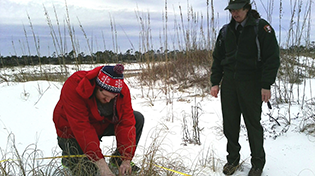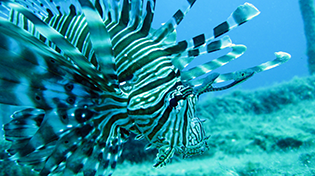Citizen Science
GIREC is prioritizing development of Citizen Science projects to engage volunteers of all ages, many with little or no prior scientific training, in collecting data to address important regional environmental issues.
Citizen Scientists gain a greater sense of environmental stewardship and a deeper knowledge about the natural resources in their community, while contributing valuable information to support natural resource management. GIREC currently offers a variety of Citizen Science opportunities for students of all ages.
Turtle THiS:
Investigating the impacts of artificial lighting on nesting sea turtles

Each summer under the cover of darkness endangered female loggerhead sea turtles briefly come ashore on beaches across the panhandle to lay as many as 100 eggs in carefully excavated nests. Typically nests are dug near the base of the shoreward dune; however, recently in Gulf Islands National Seashore nests are often established below the high tide line. These nests then must be moved by park staff to avoid being lost due to flooding. Artificial lighting is known to negatively impact hatchling sea turtles and there is some concern that lights may be impacting loggerhead nest site selection. To test this hypothesis GUIS is partnering with USGS and area schools to map night time light levels along the full length of beaches in the Florida district of the Seashore. This unprecedented, interdisciplinary collaboration between scientists, resource managers and students will provide a detailed map of light levels in the Seashore, which will then be used to determine if artificial lighting is impacting loggerhead nest site selection.
Mobile DNA Discovery Lab:
Introducing students to the tools and methods of genetic research

This project combines the wonder of exploration with the science of DNA barcoding to engage teachers and students in high-impact, project-based science education. Because academic success starts with engagement in the course material, the mobile DNA Discovery Lab has been designed to provide students with real-world experience conducting genetic research as part of an active research team. Over the last year more than 500 middle and high school students participated in a 5-class DNA barcoding unit to identify prey dissected from invasive lionfish. These type of project-based lessons allow students to gain experience with the essential tools and methods of modern genetic research, and the data the students generate can be used to support ongoing research and resource management activities. The lionfish prey DNA barcoding project was recently featured in the September issue of the International Barcode of Life Barcode Bulletin.
Native Bees and Climate Change:
Identifying species that may be threatened climate change

Bees provide a critical ecosystem service (pollination), yet we know little about their distribution, and even less about the possible effects of climate change on bee populations. This project includes more than 50 National Parks in order to predict how native bees will respond to warming temperatures and rising sea-levels. Students and NPS interns are currently sampling bees in coastal dune habitat of Gulf Islands National Seashore to identify bee populations and species that may be impacted by rising sea-level, including rare or endemic species that are potentially threatened with extinction.
Invasive Lionfish:
Determining impacts of invasive lionfish on near-shore and estuarine communities

Lionfish were first reported from the Northern Gulf of Mexico (GoM) in 2007 and now represents the dominant predator at offshore sites; however, little is known about the status of lionfish at sites closer to shore, which represent essential habitat for many commercially important species. Because the number of lionfish in an area determines the severity of their impact, an assessment of lionfish abundance and distribution represents the critical first step towards understanding the impact of lionfish, and the effectiveness of management strategies. Following completion of Scientific Diver Training, UWF students and community volunteers will assist with conducting SCUBA based lionfish surveys to establish a base-line to assess trends in lionfish abundance, size, and distribution in Pensacola Bay and Santa Rosa Sound.


